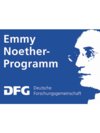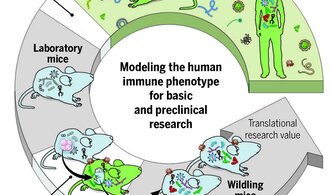The Translational Microbiome Research Laboratory
Group of Stephan RosshartProf. Dr. med. Stephan Patrick Rosshart
+49 151 40134646
Medical Center - University of Freiburg
Department of Medicine II
Gastroenterology, Hepatology,
Endocrinology, and Infectious Diseases
Hugstetter Straße 55, 79106 Freiburg
Research Topics - Born to be a wildling
„Inbred laboratory mouse strains are used extensively in basic and translational immunology research. However, the commensal and pathogenic repertoire of resident microbes encountered in the wild is not replicated in a lab setting. This can substantially distort how the immune system develops and functions, leading to false assumptions of how our own “wild” immune system works. Rosshart et al. circumvented this dilemma by implanting lab-strain embryos into wild mice (see the Perspective by Nobs and Elinav). The resultant “wildlings” had a systemic immune phenotype and a bacterial, viral, and fungal microbiome much closer to those of their wild counterparts. In two preclinical experiments, where lab mice had previously failed to predict the human response to drug treatments, wildlings accurately phenocopied patient outcomes.“ By Seth Thomas Scanlon, Science, August 2nd 2019.
The focus of my laboratory is on the microbiome and its impact on host physiology in health and in disease. By utilizing natural microbiota- and pathogen-based mouse models - such as wildlings - we are aiming to decipher fundamental biological principles as regards to infectious diseases and sepsis, various immunotherapies (e.g. antibody-based drugs), allergies as well as autoimmune- and inflammatory-diseases in the context of the hygiene hypothesis. We are aiming for a bench-to-bedside approach with the ultimate goal of identifying new treatment strategies for human diseases.
In addition, we work in close cooperation with the group of Robert Thimme.
Biography
Professor Rosshart studied biology and medicine at the Albert-Ludwigs-University Freiburg, Germany. In 2010 he obtained his doctorate degree in basic immunological research with "summa cum laude" from the University of Freiburg. After his postgraduate training in clinical internal medicine at the University Medical Center Freiburg, he joined the National Institutes of Health in Bethesda, USA for a 6-year postdoctoral fellowship in basic immunological research. During this time, he conceived the "natural microbiota theory" which he published as corresponding author in the journals Cell (2017) and Science (2019). In 2019 he took his new position as academic physician scientist and group leader of the translational microbiome research laboratory at the Department of Medicine II, University Medical Center Freiburg. His work focuses on mammalian microbiota and their impact on health and disease. He utilizes natural microbiota- and pathogen-based mouse models and a bench-to-bedside approach to identify new treatment strategies for human diseases.
Joining & Jobs & Methodology
Positions are immediately available for highly motivated candidates interested to conduct translational and basic studies in the field of microbiome research. Following qualifications are desired, but not required:
- Training and experience in mouse and human immunology
- Expertise with mouse models and corresponding techniques such as organ harvest and tissue processing procedures, surgical methods, blood drawing and injection methods using various routes / techniques
- Multiparameter flow cytometry (FACS) and mass cytometry (CyTOF)
- Cytokine / chemokine assessment using ELISA and multiplex assays such as Luminex and Mesoscale
- Sequencing methods such as 16S rRNA sequencing, shotgun metagenomics / metatranscriptomics, RNA sequencing and corresponding computional skills
A position in my group will provide excellent training opportunities in the broad field of microbiome research. Team members will learn various techniques in a highly collaborative research environment. Interested candidates are welcome to contact me directly by email.

Emmy Noether-Programm

Sonderforschungsbereich 1160 IMPATH
Deutsche Forschungsgemeinschaft DFG
Selected Publications
- Stephan P. Rosshart*, Jasmin Herz, Brian G. Vassallo, Ashli Hunter, Morgan K. Wall, Jonathan H. Badger, John A. McCulloch, Dimitrios G. Anastasakis, Aishe A. Sarshad, Irina Leonardi, Nicholas Collins, Joshua A. Blatter, Seong-Ji Han, Samira Tamoutounour, Svetlana Potapova, Mark B. Foster St. Claire, Wuxing Yuan, Shurjo K. Sen, Matthew S. Dreier, Benedikt Hild, Markus Hafner, David Wang, Iliyan D. Iliev, Yasmine Belkaid, Giorgio Trinchieri, Barbara Rehermann. Laboratory mice born to wild mice have natural microbiota and model human immune responses. Science. 2019 Aug 2;365(6452): 461. *Corresponding author.
- J. L. Linehan, O. J. Harrison, S.-Ji Han, A. L. Byrd, I. Vujkovic-Cvijin, A. V. Villarino, S. K. Sen, J. Shaik, M. Smelkinson, S. Tamoutounour, N. Collins, N. Bouladoux, A. Dzutsev, S. P. Rosshart, J. H. Arbuckle, C.-Ru Wang, T. M. Kristie, B. Rehermann, G. Trinchieri, J. M. Brenchley, J. J. O’Shea, Y. Belkaid. Non-classical immunity controls microbiota impact on skin immunity and tissue repair. Cell. 2018 Feb 8;172(4): 784-796.
- S. P. Rosshart*, B. G. Vassallo, D. Angeletti, D. S. Hutchinson, A. P. Morgan, K. Takeda, H. D. Hickman, J. A. McCulloch, J. H. Badger, N. J. Ajami, G. Trinchieri, F. Pardo-Manuel de Villena, J. W. Yewdell, B. Rehermann. Wild mouse gut Microbiota promotes host fitness and improves disease resistance. Cell. 2017 Nov 16;171(5): 1015-1028. *Corresponding author.
- G. Kugler, F. A. Flomerfelt, D. L. Costa, K. Laky, O. Kamenyeva, P. R. Mittelstadt, R. E. Gress, S. P. Rosshart, B. Rehermann, J. D. Ashwell, A. Sher, D. Jankovic. Systemic toxoplasma infection triggers a long-term defect in the generation and function of naive T lymphocytes. Journal of Experimental Medicine. 2016; 213(13): 3041-3056.
- J. P. Didion, A. P. Morgan, L. Yadgary, T. A. Bell, R. C. McMullan, L. Ortiz de Solorzano, J. Britton-Davidian, C. J. Bult, K. J. Campbell, R. Castiglia, Y. H. Ching, A. J. Chunco, J. J. Crowley, E. J. Chesler, D. W. Forster, J. E. French, S. I. Gabriel, D. M. Gatti, T. Garland Jr., E. B. Giagia-Athanasopoulou, M. D. Gimenez, S. A. Grize, I. Gunduz, A. Holmes, H. C. Hauffe, J. S. Herman, J. M. Holt, K. Hua, W. J. Jolley, A. K. Lindholm, M. J. Lopez-Fuster, G. Mitsainas, M. da Luz Mathias, L. McMillan, G. Ramalhinho Mda, B. Rehermann, S. P. Rosshart, J. B. Searle, M. S. Shiao, E. Solano, K. L. Svenson, P. Thomas-Laemont, D. W.Threadgill, J. Ventura, G. M.Weinstock, D. Pomp, G. A. Churchill, F. Pardo-Manuel de Villena. R2d2 Drives Selfish Sweeps in the House Mouse. Molecular Biology and Evolution. 2016; 33(6): 1381-1395.
Stephan Rosshart is an inventor of WildR mice with natural wild mouse gut microbiota (Rosshart et al., Cell, 2017). Taconic Biosciences licensed this mouse model from NIDDK.



